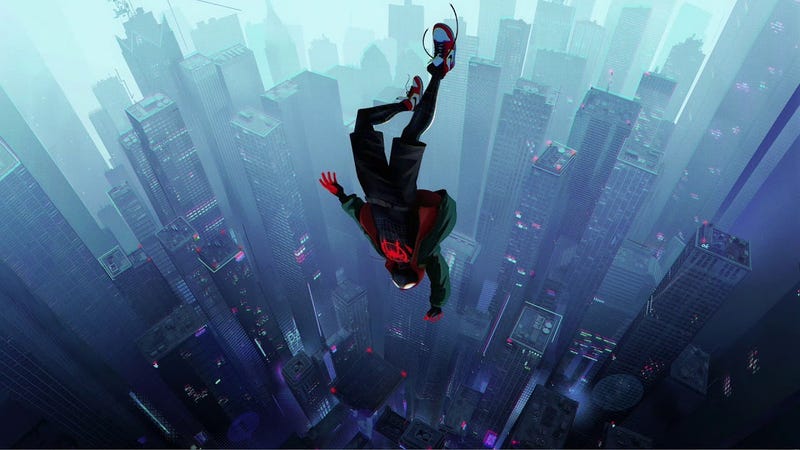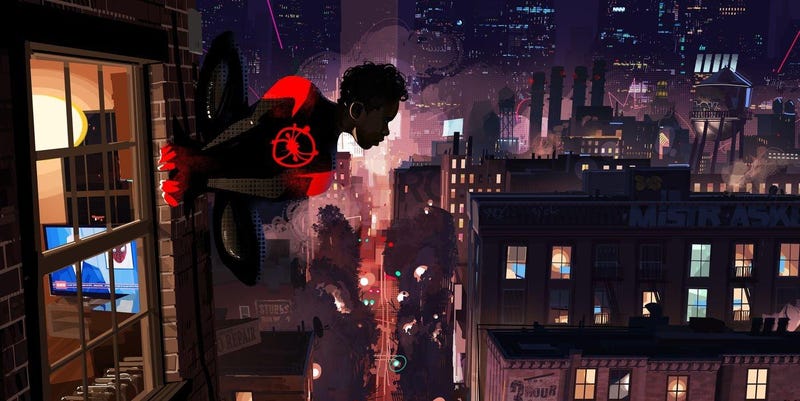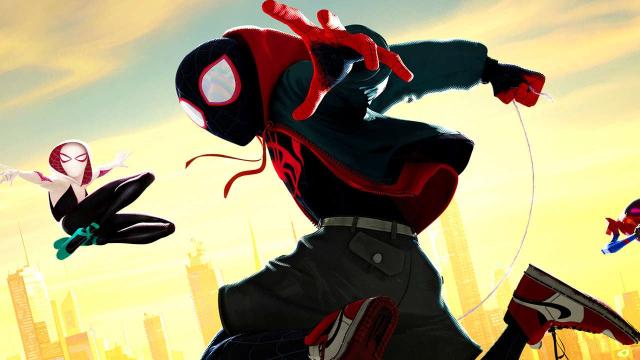Goodness gracious, has it really been five years already?
The year 2018 was a busy one for superhero movies, with game-changers like Black Panther and Avengers: Infinity War and delightful surprises in Deadpool 2 and the Teen Titans Go! movie. In this mix, no one really knew what to make of Spider-Man: Into the Spider-Verse. Not only was it the first animated Spider-Man movie, it also served as the first big push for Miles Morales, who took over the role of Spider-Man in the Ultimate Universe back in 2011 and entered mainline Marvel Comics a handful of years later.
As far as the past decade is concerned, Miles is arguably the progenitor of Big Two comics’ big diversity push. The Afro-Puerto Rican teen’s existence and audiences’ reactions to him contributed to Sam Wilson becoming Captain America, Kamala Khan as the new Ms. Marvel, Robbie Reyes’ Ghost Rider, and so on. But between his birth by Brian Michael Bendis and Sara Pichelli and the release of his movie, the comics were arguably uncertain on what to do with him: was he just a younger, more diverse spin on Peter Parker, or could he be his own person who just happens to have spider powers like Peter, Gwen Stacy, Otto Octavius, and others who’ve donned a mask and web shooters?
That question sits at the heart of both Into and its 2023 sequel Across the Spider-Verse. The first movie makes the paradox of Miles’ real-world status literal by having this version of Miles cross paths with interdimensional Spider variants that are somehow viewed as more “acceptable” (like Nicolas Cage’s Spider-Man Noir and John Mulaney’s Spider-Ham) or familiar, as we see with Peter B. Parker and Spider-Gwen. But just as important as establishing Miles as a thrilling new Spider-Man is making Miles as a person matter: from his love of art and music to his family life, the Spider-Verse films make an active effort to put his personal struggles on equal footing with his heroic woes. If the movie prioritized the spectacle over the personal, then its much-lauded leap of faith scene would still be great, but it wouldn’t hit as hard.

If there were any movie in recent memory that had a clear and inarguable cultural impact, Into the Spider-Verse would be it. It isn’t just that it ran away with 2018’s holiday season—the film racked up a ton of awards and became the first non-Disney film since 2011 to win Best Animated Feature at the Oscars. For those working in animation, the film’s success felt like a much-needed shot in the arm for the medium. You can see how the film’s impact has guided other western animation darlings in the years since, like Arcane, Puss in Boots: The Last Wish, and Disney’s Turning Red. And if you don’t think it contributed to those being what they are, don’t worry, your one animation-loving friend will happily point its influence out to you.
Another thing the movie did extremely well? Cemented Miles Morales as a Spider-Man in his own right, proving he could handle the spotlight beyond comic one-shots or miniseries. Since Into the Spider-Verse released a handful of months after Insomniac’s PlayStation 4 game, the two basically rolled out the red carpet for the developer’s Miles Morales spinoff in 2020. Even before Spider-Verse hit theaters, Insomniac clearly knew it wanted to establish Miles as a player in that universe going forward, but you can basically chart in real-time when the movie’s success started reverberating through other Miles media. His comics blew out their supporting casts and gave him his own roster of enemies, and though October’s Spider-Man 2 game starts off like a rehash of Miles’ solo title, he ends the sequel as the main Spidey. Any possibility of him abandoning the Spider-Man mantle for something that could be solely his seems to have basically vanished.
Compared to when he first debuted in 2011, and even his arrival in the prime Marvel universe in 2015, Miles is on far more equal footing with Peter now. And what makes it so interesting is that this has caught Marvel on the back foot. In another life, Miles appearing in the MCU would’ve already happened already (as 2017’s Spider-Man: Homecoming briefly teased), or been something to look forward to without hesitation. Now, whenever the live-action Miles makes his way into things, the expectations for him can’t help but be momentous and overwhelming in a way they wouldn’t have been, had Sony started Spidey’s MCU tenure with the character back in 2016. (This is also to say nothing of the issues currently plaguing the MCU at large and its inconsistent handling of teen characters.) Because Sony Animation took advantage of the opportunity provided by Sony and Marvel’s messy shared custody deal, the original Spider-Verse may have been too good at its job.

Interestingly, its success also extended to the film’s other characters. Even though her codename’s changed a few times since 2018, Spider-Gwen has basically overridden the perception of Gwen Stacy as a girl doomed to die for being Spider-Man’s girlfriend: Across has her and Miles acting as the film’s co-leads, and she’s due to headline her own animated flick with fellow Spider-Women Jessica Drew and Cindy Moon in the next few years. Everyone’s affection for a Peter Parker that got to have a lasting marriage with Mary Jane and a kid surely had something to do with Jonathan Hickman and Marco Chechetto’s upcoming Ultimate Spider-Man comic. Sony may be doing everything it can with the Spider-Man brand, but its upcoming shows in the works for Cindy (aka Silk) and Spider-Man Noir likely wouldn’t have happened if Into and Across didn’t show that there was a clear desire for Spider-Man adjacent projects that weren’t relying on a lead actor working overtime to bring audiences in.
For a movie dealing with alternate dimensions, it’s not too surprising that Into the Spider-Verse ended up being a definitive text in more ways than one. In the same way that Sam Raimi’s trilogy hangs over the modern superhero genre in its early days, the original Spider-Verse inhabits a similar space of importance, just with a wider net. As much as it’s drawing on general audiences’ affection for Spider-Man, it’s got enough style and heart to make a mark all its own.
Want more entertainment news? Check out when to expect the latest Marvel, Star Wars, and DC releases, what’s coming to cinemas in Australia this year, and everything streaming this month across all platforms. Check out our dedicated Entertainment tab for more.
